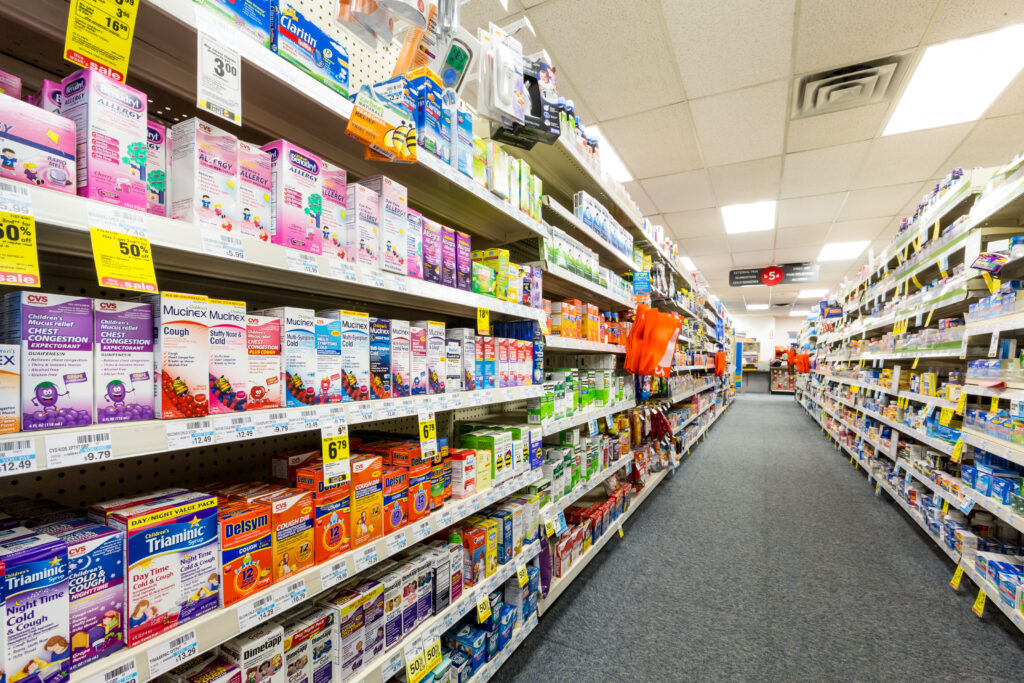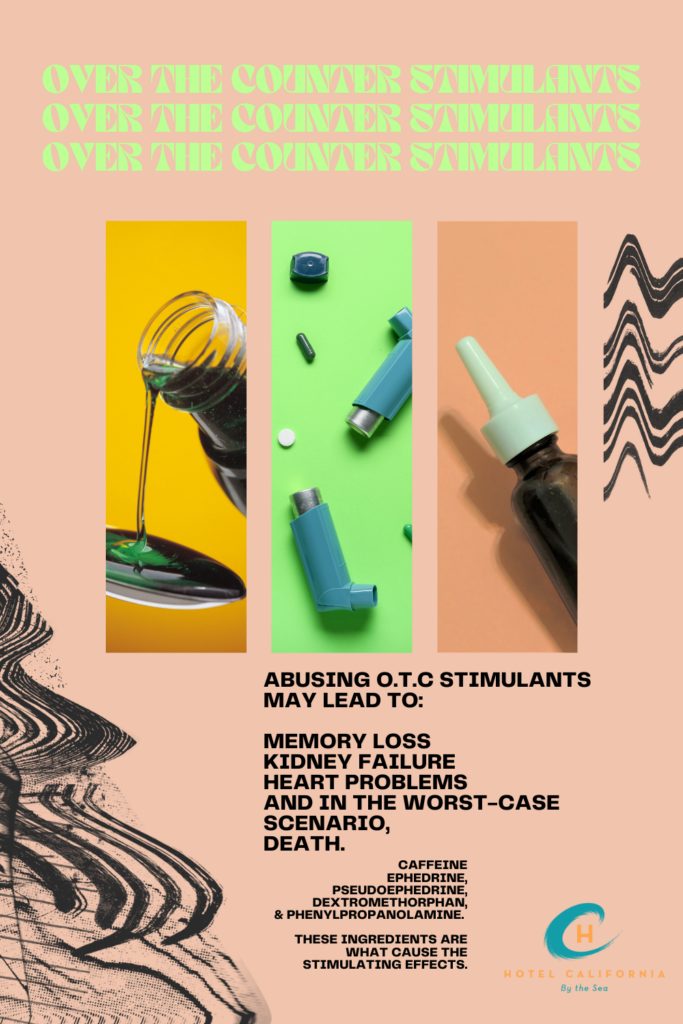Over the Counter Stimulants
Over the counter stimulants are a common type of over the counter medication that can be found in home medicine cabinets across the country. Over the counter medications are generally sold directly to the consumer without a prescription and are used to treat a wide variety of ailments including pain, cough, cold, diarrhea, constipation, acne and others.

Some of the most common over the counter stimulant medications include nasal decongestants, bronchodilators, appetite suppressants and energy pills. These fall under the category of cold and cough medicines and motion sickness medicines.
The main ingredients in these medications are ephedrine, pseudoephedrine, and phenylpropanolamine. These ingredients are what cause the stimulating effects. Over the counter medications cannot contain more than one type of stimulant. However, those who take them are also using caffeine, which is another unregulated stimulant substance.
In most cases, many people are using more than one stimulant and are unaware of the effects and risks this can cause on their health. Abusing over the counter stimulants can lead to health issues such as memory loss, kidney failure, heart problems and in the worst-case scenario, death.
Over the Counter Stimulant Abuse
Abuse of over the counter stimulants can be just as dangerous as abusing prescription and illicit stimulant drugs. Misuse or abuse of medication is taking the medication in a way other than directed on the package, taking a dose other than as directed on the package, taking the medication for its effects to get high and mixing over the counter medications in order to get high.
Like prescription medication and illicit drugs, abuse and recreational use of these drugs can change brain chemistry over time. The user can build up a tolerance and dependence on the drug and also experience withdrawal symptoms. You can overdose on over the counter stimulants and it can lead to addiction. Because of this, the DEA and FDA began creating restrictions on these stimulant medications.
The recommended daily maximum dose of ephedrine, which can be found in many types of cough and cold medications, is 120mg. Research and studies have found that for many, the average dose that some users are taking is closer to 1450mg.
Dextromethorphan (DXM) is a stimulant commonly found in over the counter cough suppressants. A DXM dose of 100-200mg can induce feelings of mild stimulation and euphoria. A dose of 200-400mg can cause euphoria and hallucinations. A dose of 300-600mg can cause a user to lose motor control and experience visual distortions. A dose of 500-1000mg can cause out-of-body sensations.

Side Effects of Over the Counter Stimulants
- Increased heart rate and heart palpitations
- Increased blood pressure
- Elevated mood
- Decreased appetite
- Blacking out
- Muscle twitching
- Extreme drowsiness
- Increased body temperature
- Vomiting
- Blurred vision
- Confusion
- Irritability and agitation
- Anxiety and changes in mood
Who is most likely to Abuse Over the Counter Stimulants?
Abuse of over the counter stimulants is most commonly seen in young people who have easy access to the drugs. It is more affordable, easily accessible and still provides a sense of high when used in excess. These include very young people, young people known to have abused substances, dieters, young professionals and athletes.
Research found that about 3.1 million young people ages 12-25 have used over the counter stimulants like cough medicine to get high. An estimated 4% of 12th graders have also abused some form of stimulant cough medication.
Check Your Insurance Coverage for FREE
Find out if your insurance covers addiction treatment in minutes. We accept most insurance!
Most commonly abused Over the Counter Stimulants
- Dextromethorphan (DXM) – DXM is found in cough and cold over the counter medications. When used in excess, it can produce stimulant and dissociative effects. It is an opioid without the effects of pain reduction. Repeated misuse of DXM can lead to addiction. When abused among young people, it can be mixed with soda leading to an effect called robo-tripping.
- Pseudoephedrine and ephedrine – These stimulant ingredients were also very common in cough and cold medications. However, due to its stimulant dangers, it is now highly regulated and rarely found in over-the-counter medications. Nasal decongestants contain pseudoephedrine. Pseudoephedrine and ephedrine are also key ingredients used to illicitly manufacture and produce street drugs like methamphetamine.
- Caffeine – Medications that contain caffeine include Excedrin migraine medication.
Naturally derived stimulants that are not regulated
Naturally derived stimulants come from plants and their roots. They are used to increase energy, reduce appetite and help improve mental clarity and focus. However, when used in large doses or used recreationally, it can result in dangerous side effects similar to that of powerful stimulant prescription medications.
- Caffeine. Caffeine is one of the most popular natural stimulants and can be found in many different types of products such as coffee, tea, diet pills and other supplements and medications. According to the FDA, adults should not drink more than 400mg of caffeine daily. However, many people often exceed that limit. Caffeine is also a natural diuretic and can cause dehydration, which can lead to other adverse side effects. Caffeine is the most studied and most widely used stimulant. Studies have shown it can help increase alertness, attention, mood, motivation and reaction time. However, when used in excess, it can also produce feelings of anxiety, insomnia and cardiovascular issues.
- Huperzine A. Hup A is an alkaloid nootropic extracted from Chinese club moss. It is an NMDA receptor agonist and promotes long-term brain health and can boost short-term memory.
- Lions mane. Lions mane is an herb supplement mushroom proven to support brain health by increasing nerve growth factors to promote mood balance and cognitive function.
- Kola nut. This natural stimulant contains caffeine, which can stimulate the central nervous system and is used to fight off mental fatigue.
- Guarana. This plant is packed with caffeine and is used to help reduce fatigue.
- Oat straw. Oat straw is a green oat grass known for its stimulating effects and energy. It can increase electrical activity in the brain’s left front temporal area resulting in mental arousal and alertness. It can boost cognitive performance.
- Ashwagandha. This herb stimulant is an adaptogen that can aid in improved mental energy and reduce feelings of fatigue.
- Ginseng. Ginseng is a natural stimulant that enhances mental and physical activity. It can also improve cognition and the thinking process.
- Maca. Maca is another natural stimulant that contains amino acids and fatty acids that can help improve memory, athletic performance and energy.
- Yerba mate. This stimulant is derived from the evergreen tree and contains caffeine and works by stimulating muscles and blood vessels. It can help enhance energy, memory and alertness.
Reach out to Hotel California by the Sea
We specialize in treating addiction and other co-occurring disorders, such as PTSD. Our Admissions specialists are available to walk you through the best options for treating your addiction.
Do you have a Stimulant Use Disorder?
Many people believe over the counter stimulants are harmless. And in general, if used per the recommendation on the packaging, it can be safe and effective. Over the counter stimulants include medications that contain caffeine, pseudoephedrine or ephedrine. These products are diet pills, nasal decongestant sprays, cough and cold medications.
When abused or used recreationally, these stimulant medications can cause dangerous side effects such as hallucinations, shortness of breath, dizziness and seizures. Users who develop a tolerance and dependence on these medications can eventually develop an addiction to stimulants. Stimulant addiction can occur not only in prescription and illicit stimulant use but also in over the counter stimulant abuse.
Behavioral health treatment programs such as Hotel California by the Sea provide treatment for all types of substance abuse including stimulant addiction. We offer treatment at all levels of care including detox, residential, PHP and IOP. We utilize evidence-based methods such as CBT, DBT and group therapy to help our clients understand the root cause of their addiction. Hotel California by the Sea is dedicated to helping clients achieve recovery and overcome their addiction.
References:
https://www.verywellmind.com/otc-adhd-medication-6500982
https://www.mayoclinicproceedings.org/article/S0025-6196(11)63394-6/fulltext
https://nida.nih.gov/publications/drugfacts/over-counter-medicines
https://www.addictioncenter.com/drugs/over-the-counter-drugs
